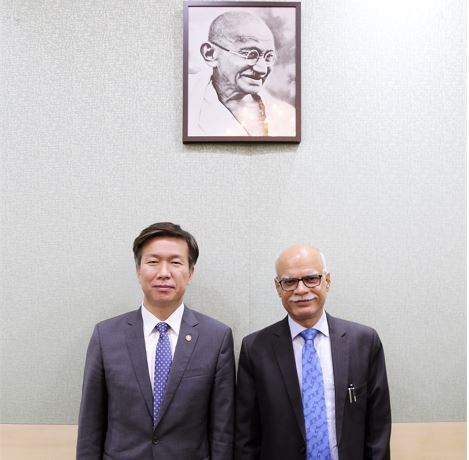 |
National Tax Service commissioner Kim Dae-ji (left) poses with India’s revenue secretary Tarun Bajaj in New Delhi on Thursday. (National Tax Service) |
SEJONG -- The tax administrative agencies of South Korea and India have agreed to closely coordinate on easing tax burdens for businesses by holding a bilateral meeting of chiefs, the National Tax Service said Friday.
The two also have decided to exchange know-how in uncovering practices of offshore tax evasion.
During their meeting in New Delhi on Thursday, NTS commissioner Kim Dae-ji expressed gratitude to his counterpart Tarun Bajaj for the Indian tax authority’s recent policy to prevent double taxation on Korean firms operating business there.
“Kim also gratefully acknowledged India’s operation of the Korean firms-only tax consultation desk,” said the NTS.
The two chiefs reached consensus on resolving a variety of tax burden difficulties held by Korean and Indian enterprises on a continuous basis. Their agreement is aimed at envigorating mutual trade and investment.
India is one of the core trading partners of Korea, under which 1,340 Korean firms have made inroads into the nation. The bilateral diplomatic relations have been elevated to “special strategic companionship ties” since 2015.
In 2021, the trade balance between the two nations reached an all-time high of $23.7 billion (28.5 trillion won), with the investment scale reaching $7.2 billion.
The NTS said the two chiefs would also carry out collaborations on taking countermeasures against malfeasance by offshore tax evaders.
Before the meeting in India, Commissioner Kim held a meeting with his Georgian counterpart Levan Kakava in Tbilisi, Georgia on Monday.
The two chiefs discussed ways to introduce a digital-based taxation service in a bid to raise transparency and accuracy in levying taxes on corporations and households.
Korean enterprises are focusing on the nation as a prospective trade partner in terms of development of resources and investment in infrastructure, since a bilateral pact on economic cooperation took effect in 2019.
The NTS said it has been “pushing for tax administration diplomacy with its partner countries, which could be a part of sustainable development.”
By Kim Yon-se (
kys@heraldcorp.com)







![[Today’s K-pop] Blackpink’s Jennie, Lisa invited to Coachella as solo acts](http://res.heraldm.com/phpwas/restmb_idxmake.php?idx=644&simg=/content/image/2024/11/21/20241121050099_0.jpg)
